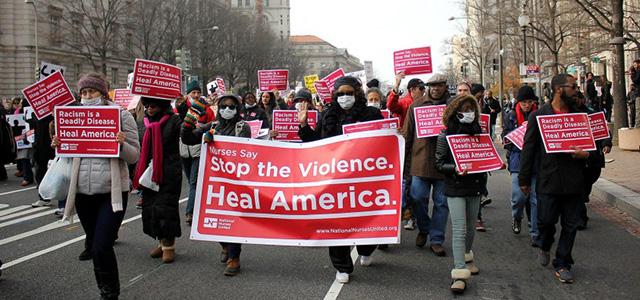NNU Statement on Black Lives Matter and the Health Impact of Societal Racial Disparities

NYSNA is appreciative of our allies at National Nurses United, who released the following statement about the #BlackLivesMatter movement:
National Nurses United joins with the AFL-CIO and activists across the United States in urging all presidential candidates to address the pervasive problems of racial and economic justice that have so stained our nation.
For nurses, the national dialogue this week about structural racism is a reminder that health, which includes personal safety, is a broad thematic that affects all corners of the national debate – from police shootings to the courts to incarceration, and racial disparities in healthcare, housing, job opportunities, and education.
Systemic racism also contributes to additional race-based violence, such as the horrific massacre that claimed nine lives in an African-American church in Charleston, S.C.
While there are clear correlations between structural racism in the criminal justice system and economic and social justice, each area is also a clear and present danger to life and health, as well as an infringement on the human rights of those affected and on American democracy. As nurses, we are dedicated to preventing all forms of illness, protecting health, and alleviating human suffering.
- Black lives matter. According to a Washington Post database, more than 500 people, a disproportionate number of them African-American, have been shot dead by police this year. Others, such as Sandra Bland, who died in a Texas jail cell under suspicious circumstances, have died while in police custody. Harassment based on race remains evident in too many routine police matters as well, evidenced by “stop and frisk” practices. All have serious health consequences from loss of life to serious injuries to exacerbating physical and mental health problems.
- Inequity in incarceration. With 5 percent of the world population, the United States has 25 percent of the world’s prisoners. Though only one-fourth of the U.S. population combined, African-Americans and Latinos comprise 58 percent of the prisoners. One in three African-American males born today is likely, under current trends, to spend time in prison. Arrests for drug offenses and minimum sentencing laws disproportionately affect African-Americans. In addition to the disparate treatment based on race, inadequate health services are common in prison settings and, the NAACP notes, infectious diseases are highly concentrated in prison settings.
- Racism remains a significant public health issue. Even with the implementation of the Affordable Care Act, racial disparities continue in access to health services and health outcomes. African-Americans, for example, have shorter life expectancies, higher infant mortality rates, and higher rates of chronic illness, such as higher blood pressure, that can lead to strokes and diabetes than whites. Overall racial discrimination significantly contributes to stress and other adverse health factors.
- African-Americans and Latinos have higher jobless rates than white Americans, and have been disproportionately affected by cuts in public-sector jobs, long a key area where ethnic minorities, who face greater racism in private employment, have traditionally had greater opportunity. A result is lower incomes and a wealth gap, which are significant factors in higher rates of medical bankruptcies, lack of health insurance, failure to seek timely medical care, malnutrition, and stress-related health disorders.
Each one of these areas, as well as racial disparities in other walks of life, such as education, housing and homelessness, and environmental racism, deserve attention and systemic solutions from candidates for elected office and other institutions of our society.
NNU supports efforts at comprehensive solutions including, but not limited to:
- Comprehensive criminal justice reforms, including national standards for greater public oversight, accountability, and prosecution for rights violations, improved racial bias training, and diversity in hiring.
- Systemic prison and sentencing reform to reduce mass incarcerations and disparities, and improved prison and jail health services.
- Genuine, universal guaranteed healthcare based on a single standard of quality care for everyone, best achieved by an upgraded and expanded Medicare for all that would help reduce racial disparities and discrimination in healthcare.
- An end to austerity economic policies that disproportionately affect minority populations. Focus on increased revenue, not budget cuts, such as could be achieved by a tax on Wall Street speculation that could raise hundreds of billions of dollars annually for living-wage job; increased funding for healthcare, housing, and education; and robust action to combat climate change and environmental devastation that also hit low-income and minority communities in higher percentages.